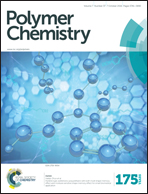Bimetallic aluminum complexes with cyclic β-ketiminato ligands: the cooperative effect improves their capability in polymerization of lactide and ε-caprolactone†
Abstract
A series of new binuclear aluminum complexes containing β-ketiminato ligands R[N![[double bond, length as m-dash]](https://www.rsc.org/images/entities/char_e001.gif) CHC4H4(C6H4)OAl(CH3)2]2 (4a, R = CH2CH2; 4b, R = C6H10; 4c, R = CH2(CH3)2CH2) have been synthesized in high yields. These complexes were identified by 1H, 13C NMR spectroscopy, elemental analysis and X-ray structural analysis. It was demonstrated that both of the complexes have two symmetric segments, and each segment adopted a distorted tetrahedral geometry. They were tested as the precursors for ring-opening homo and copolymerization of ε-caprolactone (ε-CL) and L-lactide (L-LA) in the presence of iPrOH as an initiator. Both the cooperative effect and steric hindrance have significant effects on the catalytic activity. Impressively, complex 4c can efficiently catalyze ring-opening polymerization of ε-CL even when 1000 equiv. of monomer was used, and high conversion up to 94% could be easily reached within 30 min. Meanwhile, 4c exhibited rather high catalytic activity for the ROP of L-LA with a narrow molecular weight distribution. The monomer conversion reached completion in only 1 h when the L-LA/Al molar ratio was 100 at 80 °C. To the best of our knowledge, binuclear Al complexes exhibiting such an excellent catalytic performance toward the ROP of LA and CL have seldom been reported. Based on the living characteristics, PLA-b-PCL from the “poly(lactide) block first” route was easily prepared by sequential ROP of L-LA and ε-CL.
CHC4H4(C6H4)OAl(CH3)2]2 (4a, R = CH2CH2; 4b, R = C6H10; 4c, R = CH2(CH3)2CH2) have been synthesized in high yields. These complexes were identified by 1H, 13C NMR spectroscopy, elemental analysis and X-ray structural analysis. It was demonstrated that both of the complexes have two symmetric segments, and each segment adopted a distorted tetrahedral geometry. They were tested as the precursors for ring-opening homo and copolymerization of ε-caprolactone (ε-CL) and L-lactide (L-LA) in the presence of iPrOH as an initiator. Both the cooperative effect and steric hindrance have significant effects on the catalytic activity. Impressively, complex 4c can efficiently catalyze ring-opening polymerization of ε-CL even when 1000 equiv. of monomer was used, and high conversion up to 94% could be easily reached within 30 min. Meanwhile, 4c exhibited rather high catalytic activity for the ROP of L-LA with a narrow molecular weight distribution. The monomer conversion reached completion in only 1 h when the L-LA/Al molar ratio was 100 at 80 °C. To the best of our knowledge, binuclear Al complexes exhibiting such an excellent catalytic performance toward the ROP of LA and CL have seldom been reported. Based on the living characteristics, PLA-b-PCL from the “poly(lactide) block first” route was easily prepared by sequential ROP of L-LA and ε-CL.


 Please wait while we load your content...
Please wait while we load your content...